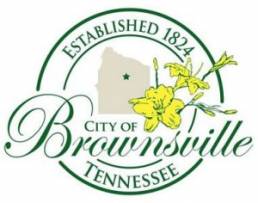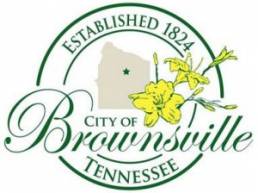ORDINANCE # 949
AN ORDINANCE OF THE BOARD OF MAYOR AND ALDERMEN OF THE CITY OF BROWNSVILLE, TENNESSEE, TO AMEND TITLE – – OF THE BROWNSVILLE MUNICIPAL CODE OF ORDINANCES BY ADDING A NEW CHAPTER – – ENTITLED “MOBILE FOOD SERVICE OPERATOR REGULATIONS”
WHEREAS, the Brownsville Board of Mayor and Aldermen has determined that the health, safety, and welfare of the community is endangered by the possible unsanitary practices and or conditions of transient food cart vendors within the City of Brownsville; and,
WHEREAS, the Brownsville Board of Mayor and Aldermen has determined that the establishment of regulations for these types of operations are reasonable and necessary for the protection of the public health, safety, and welfare, and for the eradication of public nuisances; and,
WHEREAS, the Brownsville Municipal-Regional Planning Commission has reviewed and recommended such these provisions; and,
WHEREAS, the Brownsville Board of Mayor and Aldermen has determined that the adoption of market and pedestrian vendor regulations is in the public interest; and,
WHEREAS, the Brownsville Board of Mayor and Aldermen has furtherly determined that the amendment of the current City of Brownsville Municipal Code of Ordinances be amended in order to establish said market and pedestrian vendor regulations is also in the public interest; and,
NOW, THEREFORE, BE IT ADOPTED BY THE BOARD OF MAYOR AND ALDERMEN OF THE CITY OF BROWNSVILLE, TENNESSEE, AS FOLLOWS:
SECTION 1. That Title – -, “Brownsville Municipal Code of Ordinances”, be amended by adding a new Chapter – – that contains the following language:
CHAPTER – –
MOBILE FOOD SERVICE VENDOR REGULATIONS
Article I. Generally
Section — – —. Applicability of chapter.
This chapter shall apply to mobile food service vendors operating within the municipal boundaries of the city.
Section — – —. Definitions.
The following words, terms and phrases, when used in this chapter, shall have the meanings ascribed to them in this section, except where the context where the context clearly indicates a different meaning:
“Canteen Trucks” – are vehicles that operate to provide food services to employees at a location where access to other good service is impractical (e.g. a construction site); from which the operator vends fruits, vegetables, pre-cooked foods such as hot dogs, pre-packaged foods, and pre-packaged drinks that require no preparation or assembly of foods or beverages except for the heating of pre-cooked foods; which operate at a single location for a period not longer than 1.5 hours; and which do not advertise in any form to the general public except by virtue of signage on the vehicle. Canteen Trucks that operate other than as defined herein are Food Trucks and must comply with all Food Truck Regulations.
“Mobile Food Service Vehicle” – means a Food Truck or an Ice Cream Truck and includes any other portable unit that is attached to a motorized vehicle and that is intended for use or in service to the operations of the Mobile Food Service Vehicle.
“Food Trucks” – are vehicles from which the operator cooks, prepares, or assembles food items with the intent to sell such items to the general public and which may market their products to the public via advertising, including social media.
“Operate” – means to promote or sell food, beverages, and other permitted items from the Mobile Food Service Vehicle and includes all tenses of the work.
“Operator” – means any person owning, operating, or permitted to operate a Food Truck and collectively refers to all such persons.
“Vehicle” – means every device in, upon, or by which any person or property is or may be transported or drawn upon a highway, excepting devices moved by human power or used exclusively upon stationary rails or tracks.
Section — – —. Mobile Food Service Operators prohibited except in designated areas.
All pedestrian vendors are hereby prohibited from operating upon city streets, sidewalks, or public property within the municipal boundaries of the City of Brownsville, except as provided in this chapter. It is a violation to operate a Mobile Food Service Vehicle at any location except in compliance with the requirements of this article. Mobile Food Service Vehicle operators must comply with all state and local business tax regulation.
Section — – —. Locations and Hours of operation.
- Food Trucks
- Public Property. Food Trucks may operate on the City of Brownsville Farmer’s Market property located at the intersection of Jefferson Street and Dupree Avenue, the Methodist Healthcare Girls Softball Complex located on Boyd Avenue only when softball games are not being played, the A. Franklin Smith, III Baseball Complex located on Welch Street, only when baseball games are not being played, as well as other designated municipal property authorized by the City of Brownsville only at the times permitted by the City of Brownsville as public property upon which Food Trucks can operate.
- Hours of operation. Hours of sale for Food Truck operators shall be from 10:00 a.m. until 6:00 p.m. Food Truck operators must move their food trucks from their locations after this period. In cases of special events sponsored by but not limited to the City of Brownsville, a duration of operation extension may be petitioned for. Hours of operation may be extended by the mayor during special events.
- Food Truck operators may operate no more than three (3) days per week.
- Mobile Food Service Vehicles
- Right-of-way. Mobile Food Service Vehicles may not operate from the right-of-way at any one location for more than 15 minutes without relocating to another location not less than one-quarter mile from the previous location.
- Residential Neighborhoods. Mobile Food Service Vehicle operators are permitted to travel and sell along the right-of-way of residential streets located within the City of Brownsville.
- Hours of Operation. Mobile Food Service Vehicles may not be permitted to sell in residential neighborhoods until after 11:00 a.m. and before sunset.
- Mobile Food Service Vehicle operators may operate no more than three (3) days per week.
Section — – —. Operating Requirements.
(A) Vehicle Requirements.
Licensing. Mobile Food Service Vehicles must be licensed in accordance with the rules and regulations of any local, state, and federal agency having jurisdiction over motor vehicles and all products sold therein must be properly licensed, permitted, and allowed by local, state, and, federal laws or regulations.
(B) Right-of-way.
(1) Mobile Food Service Vehicles may not operate stop, stand, or park in any area of the right-of-way that is intended for use by vehicular travel or that in any way impedes the use of the right-of-way or that present an unsafe condition for patrons, pedestrians, or other vehicles.
(2) Food Trucks may operate within the right-of-way only at times and locations designated within this Chapter.
(3) Unless authorized in writing by the City of Brownsville, all Mobile Food Service Vehicles are prohibited from operating in public alleys.
(4) Food Trucks shall park in the same direction as traffic, with no more than eighteen inches (18”) between the curb face or edge of pavement and with the service window of the Unit facing the curb.
(5) A Food Truck may park in more than one parking space in the right-of-way.
(6) Food Trucks are prohibited from operating in angled parking spaces in the public right-of-way.
(C) Business Access. No Mobile Food Service Vehicle may operate in a location that impedes the ingress to, egress from, or signage of another business or otherwise cause undue interference with access to other business or emergency areas, paths, or facilities.
(D) Noise. Amplified music or other sounds from Mobile Food Service Vehicles may not at any time unreasonably disturb nearby businesses, pedestrians, or vehicles.
(H) Commissary. If the operator has a fixed, non-mobile establishment or any other place that is used for storage of supplies, the preparation of food to be sold or served at o by Mobile Food Service Vehicle, or the cleaning and servicing of the Mobile Food Service Vehicle, such a commissary location within the City of Brownsville, Tennessee cannot be located in any residential zoning district unless such commissary complies with all applicable zoning regulations, international building code requirements, and requirements of the Brownsville Utility Department.
(J) Utilities. All Mobile Food Service Vehicles shall comply with the version of the electrical code currently adopted by the City and any power, water, or sewage required for the Mobile Food Service Vehicle shall be self-contained and shall not use utilities drawn from other sources.
(K) Fire Extinguishers Required. All Mobile Food Service Vehicles must be equipped with a 2-A:10-B:C fire extinguisher that is certified annually by a licensed company. Additionally, any Mobile Food Service Vehicle that produce grease laden vapors (e.g. those units with deep fat fryers or flat top griddles) must be equipped with a K-Class fire extinguisher that is certified by a licensed company.
(L) Waste Collection. The area of a Mobile Food Service Vehicle operation must be kept neat and orderly at all times. Operation of a Mobile Food Service Vehicle in an area is deemed acceptance by the operator of the responsibility for cleanliness of the reasonable area surrounding the operations (not less than 20 feet from all parts of the vehicle) regardless of the occurrence or source of any waste in the area. The operator must provide proper trash receptacles for public use that are sufficient and suitable to contain all trash generated by the Mobile Food Service Vehicle during the period of operation at a location. All trash within the area of operations must be removed and all garbage, trash, and trash receptacles must be removed when full and prior to departure of a Mobile Food Service from a location.
(M) Alcohol sales prohibited. Food Trucks may not sell alcoholic beverages unless there is a special event sponsored by the City of Brownsville. In these instances, the operator must first obtain a special event permit in addition to a temporary beer permit to be issued by the City of Brownsville.
(N) Insurance Requirements. Mobile Food Service Vehicles shall obtain, at a minimum, any motor vehicle insurance required by any local, state, or federal laws and regulations.
Section — – —. Mobile Food Service Permits.
- No Mobile Food Service Vehicle may operate within the City without a Mobile Food Service Permit issued by the City. A Mobile Food Service Permit authorizes the holder only to engage in the vending of products from a Mobile Food Service Vehicle in compliance with the adopted Municipal Code as specified on the permit. The Mobile Food Service Permit must be prominently displayed when the Mobile Food Service Vehicle is in operation.
- A Mobile Food Service Vehicle operator shall apply for a Mobile Food Service Permit by payment of a $5.00 permit fee.
- A Mobile Food Service Permit expires at the end of the day it is issued and may be renewed provided that all City requirements are met and the license has not been suspended or revoked.
- A Mobile Food Service Permit may not be transferred except as part of the sale of an interest in a business holding the license or a sale of substantially all of the assets of a business holding the license.
- Temporary Permit. If an operator is found to be operating within the City of Brownsville without a Mobile Food Service Permit, the operator will be cited and the City will issue a Temporary permit that will allow the operator to operate for not more than one hour after which time the Temporary Permit will be revoked. The operator will pay a fine of $50.00 to offset the costs of compliance measures, inspections, and correction of any circumstance resulting from the operator’s failure to comply with this Chapter.
- A City Enforcement Officer may provide one (1) warning to any operator for a violation of this section except that a citation shall be issued as set forth in the section.
- A City Enforcement Officer must issue a citation to the mobile food service operator for the following:
- A second violation of this section is found to have occurred after a warning has been issued within the previous six (6) months; or
- Any violation that constitutes ground for revocation of a mobile food service permit.
- A Mobile Food Service Permit shall be suspended until restatement upon the issuance of a citation for the following reasons:
- A second violation of this section is found to have occurred after a warning has been issued within the previous six (6) months;
- The required vehicle license, health permit, or business tax license for the operator or the Mobile Food Service Vehicle has expired or been suspended, revoked, or otherwise terminated;
- The operator fails to obtain or maintain the insurance coverages required by this section.
- The City of Brownsville shall revoke a Mobile Food Service Permit after two (2) suspensions within a twelve (12) month period except that the Mobile Food Service Permit revoked if (i) if an operator fails to obtain a permit and upon expiration of the Temporary Permit as set forth in the Article; or (ii) the operator operates in an unlawful manner such a manner as to constitute a breach of the peace, interferes with the normal use of the right-of-way, or other wise constitutes a menace to the health, safety, or general welfare of the public.
- An operator may reinstate a suspended Mobile Food Service Permit by payment of a fee of $50 to offset the City’s costs of compliance measures, necessary inspections, and the correction of any circumstance that lead to the suspension.
- The City of Brownsville may allow an operator to reapply for a Mobile Food Service Permit after three (3) months from the date of revocation, the operator corrects all circumstances and that lead to the violations, and the operator pays a fee of $50.00 to offset the City’s costs of compliance measures, necessary inspections, and the correction of any circumstance that lead to the revocation.
(F) Special Event Permit Procedure. Operators must obtain special event permits through the Special Event Coordinator for that event. The Special Event Coordinator will in turn provide the City of Brownsville carbon copies of the permits issued for record keeping purposes.
SECTION 2. BE IT FURTHER ORDAINED, that this ordinance become effective immediately upon its adoption by the Brownsville Board of Mayor and Aldermen.
To view this ordinance as a PDF document CLICK HERE
Related Posts
City of Brownsville plans statue to honor Tina Turner
BROWNSVILLE TN (April 13, 2024): A six-foot bronze statue of Tina Turner is planned for Brownsville Tennessee. In a…
Please take our Parks Input Survey
The input received from the community will support the preparation of a Parks and Recreation Master Plan that will…
Local Citizens Organize New Nonprofit to Protect the Hatchie River
Brownsville, TN, 3/20/2024: The Hatchie River Conservancy (HRC), a new nonprofit organization, has been created by a…
2024 Black History Month: William Rawls Jr.
WBBJ spotlights Mayor Rawls in Black History Month feature.…
City Hall will be closed -UPDATED
Brownsville City Hall will be closed Tuesday, January 16, 2024 and Wednesday, January 17, 2024 due to inclement weather…
Bluegrass Jamboree features musical history of the genre
BROWNSVILLE TN (October 7, 2023): The Hatchie Bottom Bluegrass Jamboree is set for Saturday, October 14, at the West…
Mayor Rawls’ State of the City 2021 Address – July 2023
Mayor Rawls’ State of the City 2021 Address
Commissioner McWhorter to Participate in Enchem America Inc. Announcement in Brownsville, Tuesday, June 27, 2023
(TNECD) Commissioner Stuart McWhorter will join Enchem America Inc. officials in Brownsville tomorrow, Tuesday, June…
Governor Lee, Commissioner McWhorter Announce Enchem America Inc. to Locate US Manufacturing Operations in Brownsville
• Leading electrolyte manufacturer to select Tennessee for second U.S. facility, create 190 new jobs in Tier 4, At-Risk…









